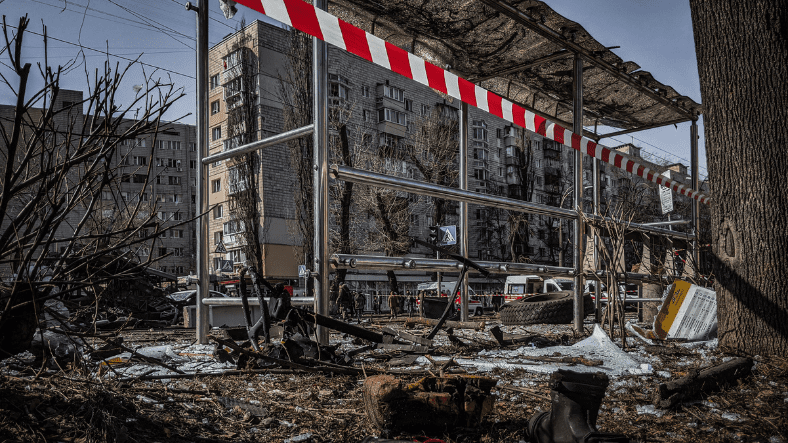This article originally appeared in the Globe and Mail.
By Chris Alexander, February 16, 2024
We will soon mark two dark anniversaries – and the response to them may yet determine whether the next generation lives in times of war or peace.
On Feb. 24, 2022, Russia launched a full-scale invasion of Ukraine to take Kyiv, topple a legitimate government and prevent Ukraine’s integration with European institutions and markets.
Vladimir Putin and his cronies only dared to launch an attack on this scale because they had just seen the humiliating U.S. and NATO withdrawal from Afghanistan, signalling a lack of allied resolve in Washington and Brussels.
But the second anniversary is perhaps more important.
On Feb. 20, 2014, Russian military intelligence operatives, wearing no insignia, began an armed takeover of Crimea that extended that year to 7 per cent of Ukraine. They did this three days before Canada’s men’s hockey team won another gold medal at the Winter Olympics in Sochi, which Mr. Putin was hosting.
Today, Russian forces occupy 18 per cent of Ukraine.
Why did they invade? For three centuries, Russia’s imperialist leaders have thought Ukraine should be ruled from Moscow. When Ukraine and Belarus briefly became independent after the First World War, Lenin and his Bolsheviks brutally crushed those nascent states.
Those times were supposed to have ended in 1991, when Ukraine, Belarus and others regained their independence, with strong support from democracies such as Poland and Canada. But Moscow immediately regained leverage and influence over Kyiv – by making Ukraine give up nuclear weapons; keeping the Black Sea Fleet in Sevastopol; installing corrupt governments, notably that of Viktor Yanukovych, who fled to Moscow the day after Canada’s gold; and by military force.
Deterrence failed. Mr. Putin’s 2008 invasion of Georgia – parts of which Moscow still occupies – elicited little more than a slap on the wrist. Russia’s creeping occupation of parts of Syria after 2011 led to hundreds of thousands of deaths, but never drew allied action to prevent the worst atrocities.
Ultimately, the conditions for this catastrophic invasion and occupation of Ukraine in two stages were set by a terrible misreading of Mr. Putin and his clique by Western political and business leaders, who saw them as the viable partners some wanted them to be, rather than the architects of subversion and revanchist aggression that they are.
We are still paying the price for our nonchalance toward a Russian leadership that has never hidden its ambition to overthrow democracies and remake borders by force.
In the final analysis, the issue is quite simple. Are we, as Canadians and allies, prepared to uphold a basic principle we fought two world wars to establish?
Europe will simply not be Europe if it has 28 member states on one side and genocidal militarists running roughshod over borders, sovereignty and lives on the other.
For this era of democracy, market-driven prosperity and the rule of law to continue, Russia must be defeated and Ukraine must win a decisive victory by joint efforts delivered under the banner of collective self-defence.
So far, the only allies on a war footing in support of Ukraine are on the Baltic or NATO’s eastern flank – countries that have faced Russian aggression for centuries.
At $2.4-billion, Canada’s military support to Ukraine is modest, at best – a fraction of what we could and did provide (most recently in Afghanistan) and what is ultimately needed to win.
With the U.S. Congress wavering, European commitments often blocked by Hungary’s Viktor Orban and other spoilers, and France, Germany and Britain unwilling to lead in any true sense, Canada should provide 1 per cent of its GDP – about $20-billion – in military support for Ukraine.
Ukraine’s allies should also do the following:
– take Kyiv out of the strategic grey zone and into NATO and the EU;
– dedicate NATO training, logistics, supply, munitions and other capabilities to winning the war in and for Ukraine;
– green-light Ukrainian attacks on Russia, including with ATACMS and Taurus missiles;
– dismantle Russia’s support networks for global active measures and send their spies back to Moscow;
– deny Moscow more oil revenues by lowering the sanction price cap, call the bluff of profiteering ship owners who have helped the Kremlin stay solvent, and enact secondary sanctions on states used to circumvent the current regime;
– meet all of Kyiv’s ammunition needs with wartime production levels;
– enable Ukrainian air, artillery, air defence, drone and naval supremacy;
– make hundreds of billions of dollars in Russian central-bank reserves available to Ukraine;
– indict Moscow’s entire chain of command for war crimes;
– and, finally, remove Moscow from the UN Security Council and other international bodies.
If we do all of these things, Ukraine’s victory is almost assured. If we only do some of them, Ukraine may still win – but it will take longer and cost tens of thousands more lives.
Our greatest challenge now is not the fin-de-régime Kremlin, where it’s no longer clear on any given day whether Mr. Putin or a body double is babbling for the cameras.
Our main challenge is ourselves.
If we stay weak, Ukraine will struggle, the Kremlin’s current gang will stay and a Crimea-style attack on a NATO member in the Baltic states may happen sooner rather than later.
If we back Ukraine’s victory, the hollow edifice of Moscow’s fascist regime will come crashing down.
Chris Alexander is a former deputy head of mission of the Canadian embassy in Moscow and a former Canadian cabinet minister. He is a senior fellow at the Macdonald-Laurier Institute.






